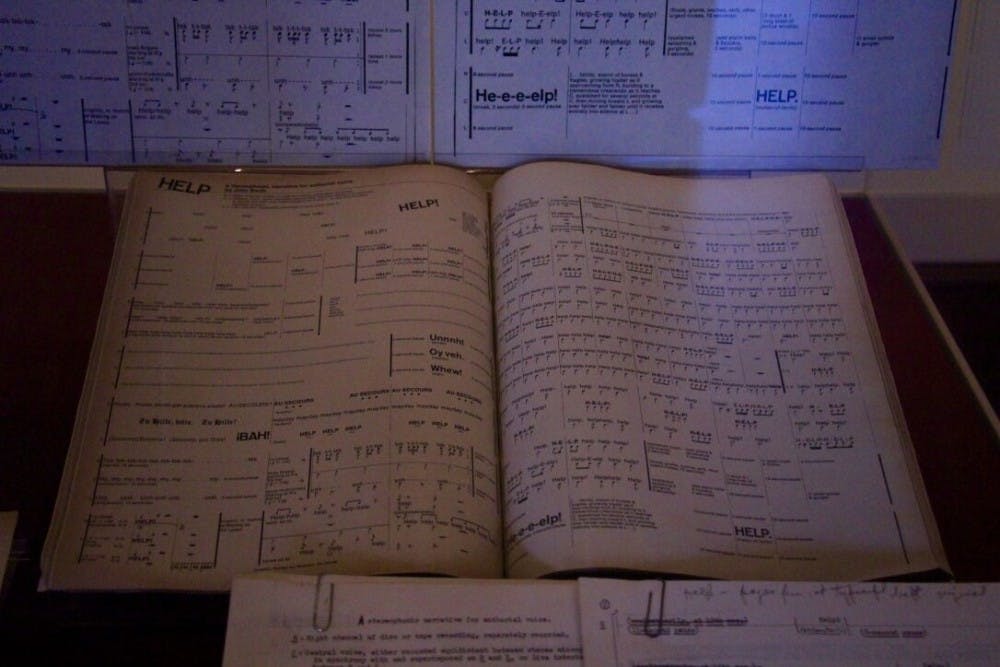By MARCIA ZIMMERMAN For The News-Letter
To celebrate the work of Writing Seminars alumnus and professor emeritus John Barth, the Sheridan Libraries premiered “Lost & Found in The Funhouse: The John Barth Collection,” an exhibition of his writing and other artifacts from his personal collection at the George Peabody Library on Sunday.
The Sheridan Libraries announced the acquisition of the collection, which also includes correspondence between Barth and other prominent writers as well as annotated books from his time as a Hopkins student, in January 2014.
The exhibit is divided into three sections — Creation, Publication and Circulation — which contain materials that correspond to a different aspect of a writer’s life.
“We decided that rather than focusing on each one of his publications or chronologically, we would show highlights from the collection that reveal what a writer’s workshop is like,” Exhibition Curator Gabrielle Dean said.
Dean, the curator of literary rare books and manuscripts in the Department of Special Collections at the Sheridan Libraries, detailed the process of putting together the exhibit, starting about two years ago when her team started picking up over 1,200 books and 20 boxes from Barth’s house around two years ago.
The first step was organizing the plethora of materials. After, Dean and her colleagues worked to find the center of the exhibition, the short story collection Lost and Found in the Funhouse, through poring over manuscripts and visual aids, reading Barth’s work and discussing it all in faithful detail.
“[Lost and Found] is a good metaphor for being lost in his archive — and what you can find there,” Dean said.
Both Dean and Jesse Chen, a senior Writing Seminars major who attended the exhibition’s opening, both said that their favorite piece showed the progression of drafts, including early handwritten notes, for one of his pieces.
“It was cool to see how his ideas advanced over time, how his work changed and how he edited his own work,” Chen said. “It was interesting to see how he starts off at the same place [we all] do.” Dean also noted that another favorite piece was a box of index cards called frame tails that were organized according to how “good” Barth deemed them. They had mini plot structures that Barth could draw back to as he wrote.
The cards provided insight as to how he wrote his stories. According to Dean, Barth combined these repeated, ordinary plot structures in surprising and interesting ways.
“What I feel very strongly about is that sometimes we forget that artists have to work hard,” Dean said. “Especially for people in the sciences, business, engineering or fields where there is a lot of cultural understanding that one needs to be taught, get trained and work hard to succeed, it is important to see that training and hard work are just as central to the arts and humanities. [Barth] is truly dedicated to his art as a producer and as a teacher.”
The exhibition opening was attended by undergraduate and graduate students, the Writing Seminars department, friends of the library, Barth’s former students and family of Barth himself.
“It was a nice social venue to talk to people and hear more about this writer and professor who had such a long history and career, especially at Hopkins. It was exciting and revealing to hear speeches from three different generations of his students, [including] ZZ Parker who I’ve read and admire especially,” Chen said. “There was one moment where Barth was talking to [a professor, and] it was interesting to see them chatting. Everyone was staring like we were watching an important meeting of great minds.”
Current Writing Seminars professor and a former student of Barth’s, Jean McGarry, spoke at the event about how much of an impact Barth made on his students.
“I was so starstruck that even when Professor Barth invited us to call him Jack, the word stuck in my throat. Master, is what I wanted to call him, or Sensei,” McGarry said in her speech. “When a compliment came from Jack, I’m not going to say it was bankable, but it was as close as a writer could come to feeling that the thing written was worth reading by anyone. And the thrill (and danger) of submitting a handmade narrative to those penetrating eyes was a constant in that semester we studied with Jack.”
Barth has won a variety of accolades for his work. In 1973 his novel Chimera won him the National Book Award for Fiction.
The next year Barth was elected to the American Academy of Arts and Letters.
In 1997 Barth accepted the F. Scott Fitzgerald Award for Outstanding Achievement in American Fiction. In 1998 he was awarded the PEN/Malamud Award for Excellence in the Short Story and the Lannan Foundation Lifetime Achievement Award.
Most recently, in 2011, Hopkins presented Barth with an honorary Doctor of Humane Letters degree.
“Lost & Found in The Funhouse: The John Barth Collection” will be on display until Feb. 28, 2016 in the George Peabody Library.





